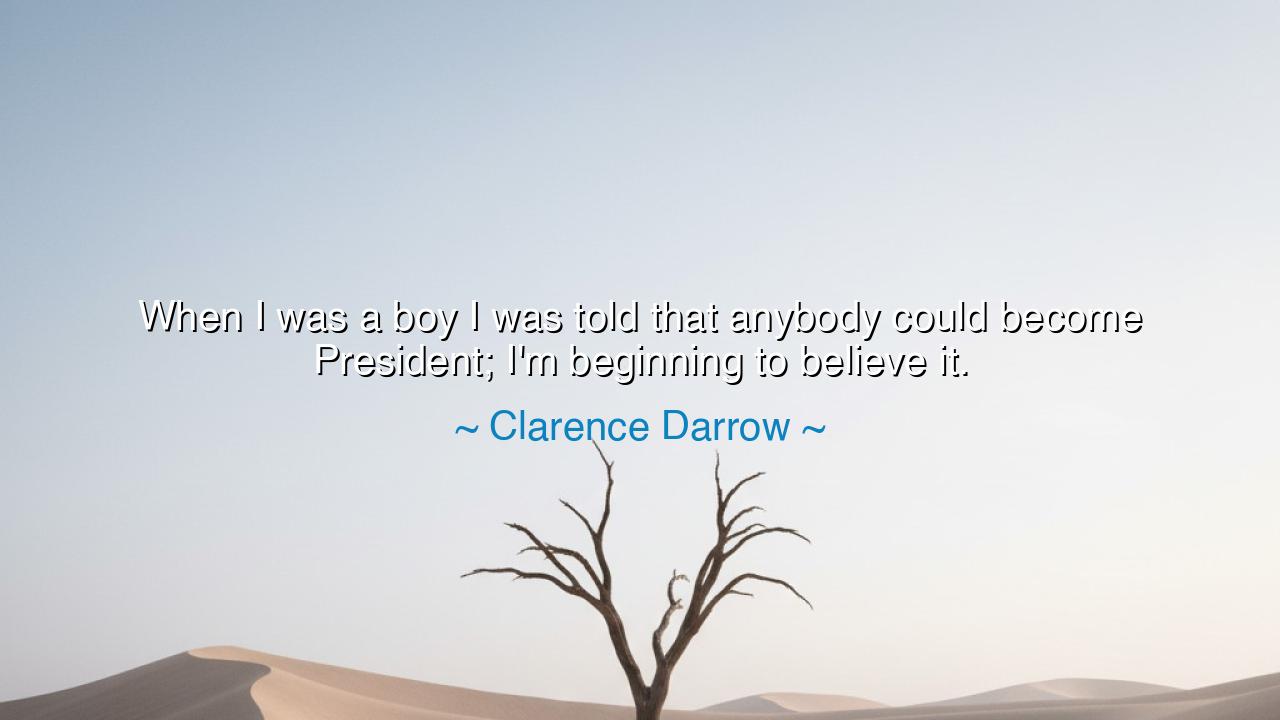
When I was a boy I was told that anybody could become President;
When I was a boy I was told that anybody could become President; I'm beginning to believe it.






The words of Clarence Darrow, “When I was a boy I was told that anybody could become President; I’m beginning to believe it,” are layered with wit, skepticism, and a touch of lament. At first, the saying appears to honor the openness of democracy, but beneath it lies a sharper meaning: that the office of President, once thought lofty and reserved for the wisest, can fall into the hands of the unworthy. Darrow, ever the sharp-tongued lawyer and critic of human folly, exposes the paradox of a system that promises greatness to all, but too often delivers mediocrity.
In the ancient spirit, these words echo the warning of philosophers who feared what happens when ambition outweighs wisdom. Plato spoke of the danger of unfit rulers, men chosen not by virtue but by chance, wealth, or the flattery of crowds. To say that “anybody” can be President is, in Darrow’s tone, no longer a celebration but a rebuke—that the office, meant to embody honor and vision, had become vulnerable to the small-minded and the ill-prepared.
History bears witness. Consider the story of Andrew Jackson, hailed by many as the champion of the common man. Though he rose from humble beginnings, his rule was marked by violent policies, including the forced removal of Native peoples along the Trail of Tears. His presidency proved Darrow’s point: that when “anybody” may ascend, it includes both the noble and the destructive, and the fate of a nation may swing wildly between them.
Yet, there is also truth in the promise of the saying’s surface. The fact that the Presidency is not bound to kings, bloodlines, or aristocracies is itself a triumph of democracy. A boy from a log cabin, like Abraham Lincoln, could rise to lead with wisdom and humility. But Darrow’s words remind us that this same openness can invite folly, when the people mistake loudness for leadership or cunning for vision.
So let this teaching endure: the power of democracy is that anyone may rise, but its peril is that anyone may rise. The people must therefore be vigilant, judging not by charm or noise, but by virtue, wisdom, and justice. For if anybody may rule, then the duty falls not only on the leader, but on the people who choose. In their hands lies the greatness or the downfall of the republic, and in their discernment rests the true destiny of the nation.






THThinh Hoang
Darrow’s quote captures a bittersweet observation on the state of American politics. The ideal that anyone can become President reflects the democratic ethos, but his words seem to express skepticism about whether this ideal has been fully realized. Has the bar for leadership been lowered, or does this reflect a broader sense of disillusionment with the political process?
CTnguyen chanh tin
Clarence Darrow’s quote is a cynical take on the American ideal that anyone can become President. While it’s meant to inspire hope, Darrow’s perspective reveals a shift from optimism to realism. Is this a commentary on the fact that presidential candidates today sometimes seem less qualified than expected, or is he simply frustrated with the political system's current state?
HDngo van hoang duc
I find Darrow's quote interesting because it raises a deeper question about the American political system. The idea that anyone can become President is a core part of the democratic dream, but Darrow’s perspective implies that this has led to a decrease in the quality of leadership. Is it possible that, while anyone *can* become President, perhaps we should set higher standards for who actually gets there?
NUNguyen Thi Nha Uyen
This quote is both humorous and sobering. It seems like Darrow is mocking the notion of anyone being able to become President by revealing how unremarkable the reality of politics can sometimes feel. Does this suggest that the office has lost its prestige, or is he simply pointing out the flaws in the system? What does it mean for democracy when leadership becomes more about accessibility than competence?
QMLe Quang Minh
Darrow’s quote seems to acknowledge the democratic principle that anyone can rise to the highest office. However, it also hints at a sense of disillusionment or perhaps frustration with the caliber of leadership. Is the idea of 'anyone' becoming President empowering, or does it imply that the position is no longer about excellence or integrity? What does this say about the nature of modern politics?